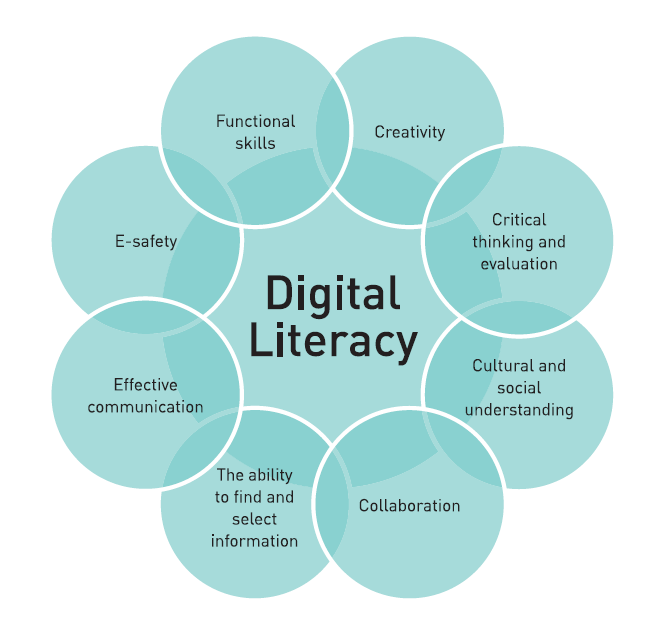

Digital Citizenship
in South Africa
Digital Literacy and Information Fluency
This is how well you can use the internet. It is there to see whether or not you are able to actually understand how you should use the interent and also whether or not you know how to search using the internet and also do you know where to type in website addresses.
It is also to see whether you know how to type in key words when looking for certain things on the interent and whether or nt you are able to find what it is that you are looking for.
-
The ability to use digital technology, communication tools or networks to locate, evaluate, use and create information.
-
The ability to understand and use information in multiple formats from a wide range of sources when it is presented via computers.
-
A person’s ability to perform tasks effectively in a digital environment... Literacy includes the ability to read and interpret media, to reproduce data and images through digital manipulation, and to evaluate and apply new knowledge gained from digital environments.
This week, Animal Planet aired two fake documentaries claiming to show scientific evidence of mermaids. I say “fake documentaries” because that’s exactly what The Body Found and The New Evidence are. The “scientists” interviewed in the show are actors, and there’s a brief disclaimer during the end credits. However, the Twitter conversation surrounding the show (#Mermaids) reveals that many viewers are unaware that the show isn’t real. (Sample Tweets: “After watching the documentary #Mermaids the body found … I believe there are mermaids!!!” and “90% of the ocean is unexplored and you’re telling me #mermaids don’t exist”—which has been retweeted more than 800 times.) It is, after all, airing on a network that claims to focus on educating viewers about the natural world. “The Body Found” was rightfully described “the rotting carcass of science television,” and I was shocked to see Animal Planet air a sequel.
1. The oceans are not inexhaustible, we’re currently overharvesting many resources, and the consequences can be disastrous.
According to the United Nations Food and Agriculture Organization, 32 percent of all global fisheries are “overexploited, depleted, or recovering” and another 50 percent are fully exploited (as of 2010). Overfishing is the single greatest threat to the ocean environment, but this isn’t just an environmental problem. Fish are a critically important natural resource, with more than 3 billion people getting at least 15 percent of their protein from the ocean. Although human population growth is still increasing, we won’t be able to increase the amount of fish we’re taking from the ocean.*
2. Current fishing practices aren’t just problematic for the fish species we are trying to catch.
Most commercial fisheries don’t use a rod and reel, catching one fish at a time and throwing back what they don’t want (or aren’t allowed to sell). A single longline can be many miles long and have tens of thousands of baited hooks; purse seine nets can be miles across; and the largest trawl net on the market can fit several 747 airplanes in its opening. Bycatch, which occurs when fishermen catch animals swimming near their target catch, is unavoidable with fishing gear this large, but the problem can be unexpectedly severe. In some fisheries, 90 percent of the catch by weight is bycatch, which includes endangered sea turtles and sea birds as well as marine mammals. Some types of fishing, such as dynamite fishing and cyanide fishing, can heavily damage the environment. Dragging a heavy trawl net over the seafloor destroys countless fragile and ecologically important organisms, the equivalent of hunting for rabbits by bulldozing a forest and killing all the deer, birds, insects, and plants that live there. The FAO estimates that 7 million tons of bycatch are caught and discarded every year.
3. Just because a fish is from “the ocean” doesn’t mean you should release it in the nearest body of salt water.
Invasive species are non-native organisms released into a new region. In the case of invasive fish, they are often introduced by aquarium hobbyists who release a fish when it gets too big for its tank. Often, there are no predators in the new habitat capable of eating these newly introduced animals. Lionfish, native to the Indo-Pacific, are believed to have been introduced to the Atlantic coast of the United States by aquarium hobbyists in the last few decades. Lionfish have no native predators in the Atlantic, and non-native predators are often deterred by their venomous spines. A single female lionfish can release millions of eggs in a year, so it’s no surprise that lionfish are now found throughout the Caribbean and as far north as New York, and they are outcompeting or eating native, economically important fishes such as snapper and grouper.
4. Sharks aren’t a threat to you, they’re important, and they’re in trouble
The average American has only a 1 in 3,800,000 chance of being killed by a shark. You’re more likely to be killed by a lawnmower or a vending machine, and more likely to be bitten by a stranger on the subway. Like all predators, sharks help keep the ocean in balance by eating the sick, the weak, and the dying. However, sharks are suffering from overfishing more than most marine species, with 1 in 6 species of shark, skate, or ray (and 1 in 3 species of open ocean shark) considered “Threatened with Extinction” by the IUCN Red List.
5. Although mermaids don’t exist, the ocean is still full of wonder, and it needs your help!
What you do affects the ocean even if you live far away, and there’s a lot that you can do to help. Purchase sustainable seafood. Use reusable grocery bags instead of single-use plastic bags, which can choke sea turtles or sea birds. Support politicians who support ocean conservation, or encourage your current elected officials to support the ocean. Most importantly, ask your friends and family to do the same.
If I’ve ruined your sense of wonder about the oceans, don’t fret. The absence of mermaids certainly doesn’t mean that the oceans are boring. As deep sea ecologist Andrew David Thaler said, "Look, the ocean is a vast, unexplored frontier. The deep sea is Earth’s last great wilderness. When we do venture into the abyss, we find creatures more diverse and incredible that our relatively limited imaginations can conceive. Don’t insult that wonder with something as utterly mundane as ‘human with fish tail.’ ”


